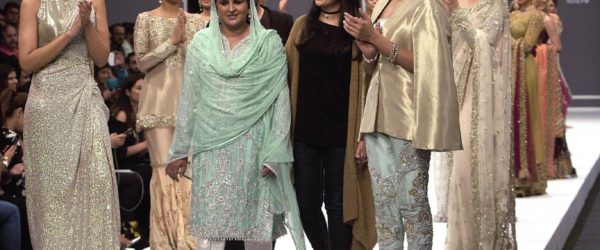*Trigger Warning* for description of sexual violence.
Mukhtaran Mai, Pakistani women’s rights activist, recently walked a fashion runway in Karachi, Pakistan. The goal, as explained, was to model courage and hope for other Pakistani women.
Mukhtaran Mai came into the spotlight 14 years ago when she was gang raped and paraded naked by men of a higher caste, as punishment for what they alleged was her younger brother’s sexual relations with a woman from another, higher, caste. In reality, as the Express Tribune reported in 2011,
“An investigation ordered by the Punjab governor in July 2002 revealed that Mukhtaran’s brother Abdul Shakoor, then 12 years old, had been raped by three men from the Mastoi tribe, who then threatened the boy to keep his abuse quiet. When the boy refused, one of the men accused him of having sexual relations with his sister, Salma, who was then at least six years older than Shakoor.”
The violence of misogyny, patriarchy, and casteism that is a part of the lives of marginalized Pakistani women was so horrific in this case, it created shockwaves across Pakistan. Six days after the violent crime a local imam condemned the actions and asked media to come to their village to speak with Mukhtaran Mai’s family, in hopes of getting her justice. As a result of the media attention, authorities arrested 14 men, 6 of whom were found guilty and sentenced to death. Since then those 6 men have all been released on appeal due to, well, the violence of patriarchy.
Mukhtaran Mai went on to become an advocate for women’s rights, especially poor women and girls. Today, in Pakistan, she is a beloved shero who continues to work for the empowerment, education, and rights of poor women and girls. Therefore, seeing her walk the runway would indeed send a strong message of courage and hope as she embodies both.
However, there have been a few problematic issues that I need to address regarding this story.
First, almost all non-Pakistani headlines have left out her name and have, instead, chosen to refer to her as “woman who was gang–raped” in some form or another. I understand that the violence that she experienced was the reason she became known. I understand that this was the unfortunate catalyst to her work as a women’s activist and advocate. But that experience is not what defines her. It’s a sensationalized dehumanization of an amazing, brave, and complex woman who is much, much more than the violence she experienced at the hands of misogynistic patriarchs. That those reading the articles in the West do not know her by name, does not mean she does not have a name, an identity. A brown, Muslim woman’s presence, existence, and value are not based on the acknowledgement of her by those in the West. Say her name, Western media, and stop describing her by dehumanized way in which you know her – as a nameless victim of violence.
![Mukhtaran Mai on the runway. [Source].](http://www.muslimahmediawatch.org/wp/wp-content/uploads/2016/11/mukhtar-mai-1-300x225.jpg)
Mukhtaran Mai on the runway. [Source].
Second, let’s talk about the elites organizing and attending the fashion show. The fashion industry in Pakistan, including all the fashion shows, is inaccessible to the vast majority of Pakistanis, including the Pakistani women with and for whom Mukhtaran Mai works. Fashion designers whose work is featured, as well as fashion models and those who attend, tend to be a very privileged lot, financially, caste-wise, and skin colour-wise (fair skin is a privileged position in South Asian contexts). Celebrities, socialites, politicians, and other rich people fill the seats at the shows. Their love for Mukhtaran Mai feels too much like congratulatory pats on their own backs. After all, it is this elite class in Pakistan that has servants and maids who come from the same class of women Mukhtaran Mai does. It is this same elite class who mistreat their servants and maids, as if they were property and talk about them with disdain and ridicule. It is this same elite class who leave their children in the hands of women from Mukhtaran Mai’s class to raise, even though those women may have children of their own to raise and love. It is this same elite class that does precious little to actually help the marginalized women of Pakistan.
Mukhtaran Mai’s choice to participate in the show was an active choice from her own agency, and she should not be criticized for it. If indeed her presence provides courage and hope to other marginalized women (if they even know she is there) then she continues to help women. However, the elite class which surrounds her at the show does not deserve praise. This is a class which not only ignores the violence experienced by marginalized women, it also, at best, condones it with their inactivity, and, at worst, actively participates in it. Having Mukhtaran Mai at the show may make them feel better about themselves, but their self-congratulation does nothing to help marginalized Pakistani women.

